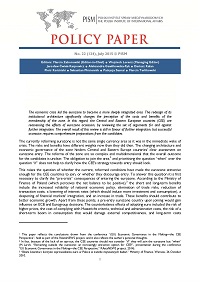№072: Belarus in the CES: Advantages and Disadvantages of Economic Integration
№072: Belarus in the CES: Advantages and Disadvantages of Economic Integration
Author(s): Anna Maria Dyner, Natalia Ryabova
Subject(s): Economic policy, International relations/trade, Developing nations
Published by: PISM Polski Instytut Spraw Międzynarodowych
Keywords: Belarus; Eastern Europe; economic policy; economy; Europe
Summary/Abstract: Belarusian accession to the Common Economic Space (CES) was forced by two factors—the 2011 crisis and the necessity to gain cheap energy resources. Although Russia fulfilled its promises, decreasing gas and oil prices, Belarus is now feeling the negative results of the integration. According to CES rules, Belarusian authorities will have to tighten monetary policy, and reduce social spending and public financing of state-owned enterprises. The situation may be improved by foreign investments, but among the three CES countries, Belarus is the least attractive, especially since Russia joined the WTO and the because of the possible accession of Kazakhstan in the near future. Because of the need to carry out the major reforms in Belarus, the European Union has a greater chance to influence the situation in that country, for example by supporting modernisation projects.
Series: PISM Policy Papers
- Page Count: 7
- Publication Year: 2013
- Language: English
- Content File-PDF

